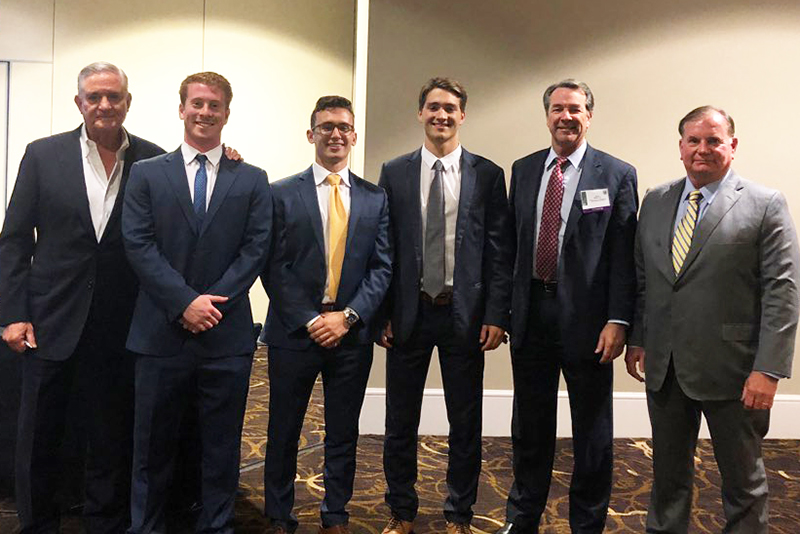Freeman hosts 4th Distressed Debt Investment Pitch Competition

A. B. Freeman School of Business students Griffin Donnelly (BSM ’19), Ben Gerber (BSM ’19) and Jack Preston (BSM ’19) were anything but distressed after taking home first place honors in the fourth annual Aaron Selber Jr. Distressed Debt Investment Pitch Competition.
The competition is the culmination of the spring edition of the Aaron Selber Jr. Course in Alternative Investments, which focuses on distressed debt. It took place on April 27 at the Sheraton New Orleans Hotel in conjunction with the Burkenroad Reports Investment Conference.
Donnelly, Gerber and Preston won this year’s competition with their pitch for taking a short play in bonds issued by the Vitamin Shoppe, a retailer specializing in nutritional supplements.
“It all comes down to financial communication,” said Myke Yest, professor of practice in finance and instructor in the course. “All three teams were very strong in their financial analysis, but I think it was the simplicity of Ben, Jack and Griffin’s pitch that set them apart. They called it ‘Short and Simple,’ and throughout their presentation they kept coming back to that theme.”
Serving as judges for the competition this year were Dewey Corley (L ’70), chief investment officer for the Selber Family Interests, Joel Daste, president of Gulf National Corp., and David Thomas, CEO of Equitas Capital Advisors.
The Aaron Selber Jr. Course in Alternative Investments was established in 2015 through a gift of the Selber family to highlight two areas of investing close to Selber’s heart: distressed debt and hedge funds. In the spring semester, the course focuses on distressed debt with readings, lectures and presentations by guest speakers active in distressed debt investing. Toward the end of the semester, the students work in teams to analyze a distressed company and propose an investment drawing on strategies presented in the class. The top three teams as selected by the class then participate in the competition following the Burkenroad Conference.
“To be honest, this was one of the years in which any one of the eight teams in the course could have gone on and competed at the Burkenroad Conference and made us proud,” Yest says. “There was no team that did a subpar job.”
Interested in advancing your education and/or career? Learn more about Freeman’s wide range of graduate and undergraduate programs. Find the right program for you.
Recommended Reading
- Finance Curriculum vs. Accounting Curriculum: How Are They Different?
- Business Analytics vs. Finance: Which Master’s Degree Is Right for You?
- Alum leverages MFIN degree to launch investment banking career
- Peter Ricchiuti: The Art of Making Things Make Sense
- What Can You Do With a Business Analytics Degree?
- Meet the MBA Class of ’26: Austin Smith
- Fintech entrepreneur Todd Schwartz to serve as 2024 Freeman Distinguished Lecturer
- Master of Finance degree leads to career in health care and analytics
Other Related Articles
- Newsweek: The Real Cost of Layoffs Isn’t In the Financials
- Conference explores opportunities in alternative investments
- CNN: Stocks rise ahead of tech earnings as Nvidia hits $5 trillion valuation
- Business Insider: Why a professor of finance isn't impressed by gold's stunning rally in 2025
- Alum launches fund to invest in Tulane-affiliated startups
- Investopedia: Rising Inflation and Slowing Growth Are Investors' Worst Nightmare
- Alum shares playbook on forensic accounting
- WWL Radio: What is crypto? Is letting it into our 401(k)s a good idea?
